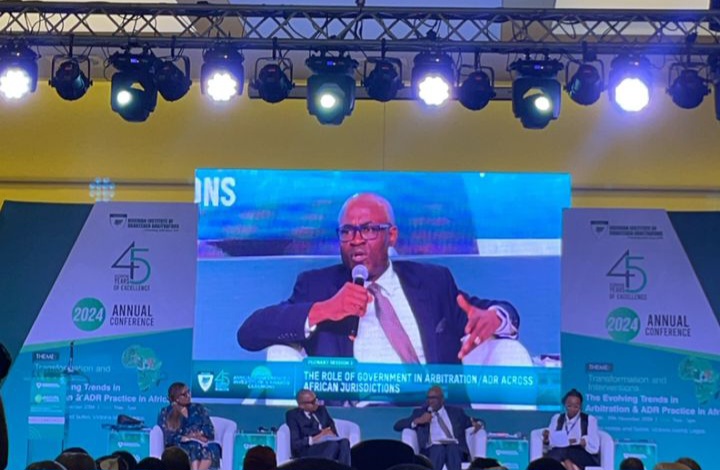Annual Conference of the Nigerian Institute of Chartered Arbitrators: A Summary of Day One
The Annual Conference of the Nigerian Institute of Chartered Arbitrators(28th and 29th of November) at the prestigious Eko Signature Hotel, Lagos. Themed “Transformation and Intervention: The Evolving Trends in Arbitration & ADR Practice in Africa,” the conference brought together leading practitioners, academics, policymakers, and stakeholders to discuss the dynamic developments shaping Arbitration and Alternative Dispute Resolution (ADR) across Africa.
Opening Ceremony
The first day began with opening remarks by Professor Yusuf Olaolu Ali, Chairman of the Planning Committee, followed by the address of the Institute’s Chairman, Professor Fabian Ajogwu, SAN, FCIArb. Both speakers emphasized the importance of fostering innovation and collaboration to advance arbitration practices across Africa.
The highlight of the opening session was the Keynote Address, delivered on behalf of Professor Benedict Oramah, which provided a comprehensive appraisal of the conference theme. The address emphasized the need for governments to take a proactive role in nurturing the growth of Arbitration in Africa, aligning legal frameworks, and creating enabling environments to attract global confidence in the region’s ADR capabilities.
Plenary Session 1
This session featured a distinguished panel of experts: Professor Emilia Onyema, Dr. Wale Babalakin, SAN, and Dr. Enga Kameni, moderated by Mrs. Funke Aboyade, SAN, FCIArb.
The panel explored the current state of Arbitration and ADR in Africa, noting significant progress in legislative reforms, the establishment of arbitration centres, and the increasing recognition of arbitration as a viable dispute resolution mechanism. However, they also highlighted persistent challenges, including issues of accessibility, political interference, and the enforcement of awards. The discussion underscored the need for continuous capacity-building and regional collaboration to address these obstacles effectively.
Plenary Session 2
This session brought together a panel of arbitrators and judges, including Folashade Alli, SAN, C.Arb, Honourable Justice Ayokunle Faaji, FCIArb, and Anne Ekongolo, moderated by Chukuma Ezeala, FCIArb.
The discourse revolved around the critical role of governments in shaping Arbitration and ADR landscapes in Africa. The panelists observed that while many African governments have supported arbitration through legislative and judicial reforms, challenges such as political interference and inconsistent enforcement of awards persist. A key recommendation was to encourage more judges to adopt arbitration practices and award costs against parties that intentionally frustrate proceedings.
The session concluded with unanimous agreement that sustained government support and commitment are essential for the long-term growth and credibility of Arbitration and ADR in Africa.
Plenary Session 3
The third plenary session, moderated by Edith Onwuchekwa, FCArb, featured contributions from Hon. Prof. Kariuki Muigua, Ph.D., OGW, FCIArb, Ch.Arb, Guled Yusuf, Funke Adekoya, SAN, C.Arb, and Hon. Justice Ayotunde Phillips, FCArb.
The discussion centered on the importance of adherence to international best practices and due process as non-negotiable elements for Africa’s readiness to thrive in global Arbitration and ADR. The panelists stressed the need for capacity-building initiatives, legal transparency, and compliance with international standards to enhance Africa’s reputation as a hub for resolving complex disputes.
the day programme concluded with two concurrent breakout sessions addressing specific sectors and emerging trends:
Breakout Session 1 addressed “Arbitration/ADR in the African Extractive Industry: Lessons Learnt and Way Forward” This session explored the role of Arbitration and ADR in resolving disputes in the mining, oil, and gas sectors. Panelists discussed the complex nature of disputes in the extractive industry and how Arbitration can provide more flexible and efficient solutions compared to traditional litigation. While Breakout Session 2 addressed “Emerging Trends in Arbitration/ADR: Insolvency, Tax-Related Matters, Banking/Finance, and SMEs” This session focused on the evolving challenges in resolving disputes in finance, taxation, and insolvency, emphasizing the growing relevance of Arbitration and ADR in addressing the needs of SMEs and other stakeholders in these sectors.
The event was formally closed by a closing remark given by Mrs. Shola Oshodi-John, FCArb, the Registrar and CEO of the Institute, who commended participants for their contributions and reiterated the importance of fostering dialogue and innovation in Arbitration and ADR practice across Africa. She also urged delegates to participate in the cocktail session by interacting with other delegates and speakers present.

